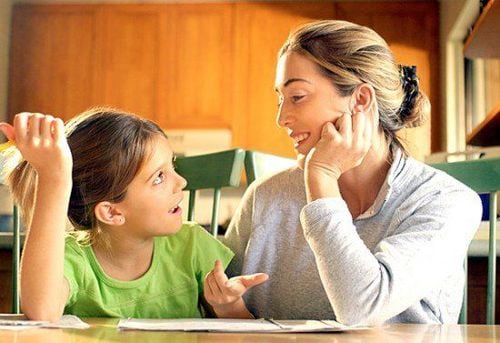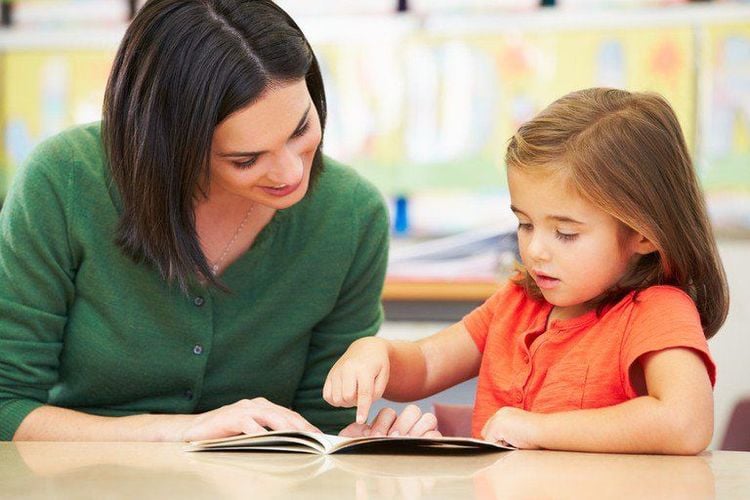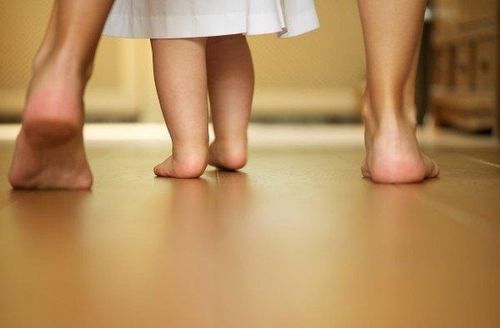This is an automatically translated article.
At preschool age, children will lie knowingly and stubbornly, often out of fear of punishment or disappointing parents, sometimes also out of forgetting. You can teach your child honesty by making sure he's safe and comfortable telling the truth.
1. Kindergarten honesty
From 3 to 4 years old, preschool children begin to distinguish truth from falsehood, but have not yet developed a guilty conscience when lying. Accordingly, the child already knows that some actions are wrong and does not want to get in trouble with the parents, so it is not possible to guarantee the child knows absolute honesty.
Moreover, children at this age are still affected by absent-mindedness, daydreaming and imagination. The truth is that the child can't remember having left a towel on the floor to confess when asked by her mother. She also believes she didn't make the mess, and is sure the wind blew the broccoli off the plate and onto the floor for the dog to eat, not her.

Dạy trẻ trung thực sẽ giúp ích cho tương lai của con
2. How to teach children honesty
Here are some tips for parents in the process of teaching children to be honest :
Avoid accusations Don't call your child a liar . This only makes them defensive, and over time, they may start to believe and live up to that moniker. Instead, let your child know that you don't like lying, but that you still love him no matter what he does. Tell your child gently but firmly, “What you say doesn't sound like the truth. We all get nervous sometimes and don't tell the truth because we're afraid we've done something wrong."
Don't ask questions when you already know the answer. If you're sure your child hasn't cleaned the room, don't ask: "Did you clean the room?" This question just sets the stage for a lie.
Instead, say, “I see you haven't cleaned your room yet.” Or better yet, “Show me your neat room.” This way, your child knows that you've verified the truth and doesn't need to lie, and you've also reminded him of the responsibility to fulfill.
If you catch your child lying, don't ask: "Are you telling the truth?" Very few children, and even adults, would answer “no, it was just a lie” to such a question. Better yet, say, “What you say sounds like a fictional story. Just tell the truth, I won't scold or punish you."
Find out why your child lies The preschooler cheated while playing board with the family, and then denies any wrongdoing. But instead of starting to criticize, remind your child, “I know you really want to win that game.” Then let her explain why she wants to win so much. Next, mother and daughter can discuss the right ways to win and the importance of fair play.

Hãy khen ngợi trẻ khi con có những lời nói trung thực
Praise when your child is honest When your preschooler tells the truth, praise him. Especially if your child has been caught lying in the past, he'll feel great about himself when he hears you say, "Thank you for telling me the truth. I love it when I see you like this."
Teach your kids that lying doesn't work We all make mistakes and children are no exception. If your preschooler staunchly denies knocking things over and breaking glass, state your view of the facts: “I know you regret it and wish you hadn't broken the glass.” Then you can let your child make up for his mistake by asking him to help clean up. Your child will learn that lying doesn't help him to deny responsibility.
Set a good example The best way to teach children honesty is to be honest. Even when it comes to difficult issues like illness, death, or divorce, try to be frank. For a preschooler, telling your child's grandmother who just passed away is "away for a while" will cause her to become anxious and confused about death, distrusting your explanations. and tend to think that telling the truth is not so important. It is better to handle every situation delicately and honestly, not avoiding the truth.
3. Note when teaching children to be honest
No one always tells the 100% complete truth. As your child gets older and begins to develop a conscience, you can help them understand the concept of a "positive lie" when people can't tell the truth because the truth can be bad, hurting others. Make sure your child knows that it's never okay to lie to gain personal gain or avoid getting into trouble.
Your child will need guidance to understand when to tell the whole truth and when to hold back. For example, if grandma gives you a gift you don't like, it wouldn't be nice to tell her you hate the gift, even if that's how you really feel. In this case, I should just thank her for caring and giving me gifts.
Be careful about your own blatant lies. For example, your child might be confused if he hears you telling the person on the other end that your husband isn't home, when actually his dad is here and just doesn't want to take the call. To model honesty in such a situation, tell the caller that your husband is currently busy and cannot answer the phone at this time.

Ba mẹ nên chính là tấm gương của sự trung thực
Thus, in order to teach children about honesty from an early age, it is important that you help them recognize how lying and honesty affect them. In some cases, a mother can set good examples for her children to learn from and follow.
For children to be healthy and develop well, it is necessary to have a nutritious diet in terms of quantity and quality balance. If children are not provided with adequate and balanced nutrients, it will lead to diseases of excess or lack of nutrients, which adversely affect the comprehensive development of children in terms of physical, mental and motor skills.
Children who do not eat properly are at risk of micro-mineral deficiency causing anorexia, growth retardation, malabsorption,... If they notice the above signs, parents should supplement their children with products. The supplement contains lysine, essential micro-minerals and vitamins such as zinc, chromium, selenium, and B vitamins to help fully meet the nutritional needs of children. At the same time, these essential vitamins also support digestion, enhance nutrient absorption, help improve anorexia, and help children eat well.
Parents can learn more:
Signs of zinc deficiency in children
Micronutrient deficiency and failure to gain weight in children
Please regularly visit Vinmec.com website and update useful information to take care of your child. Take care of the baby and the whole family.
Reference source: babycenter.com













